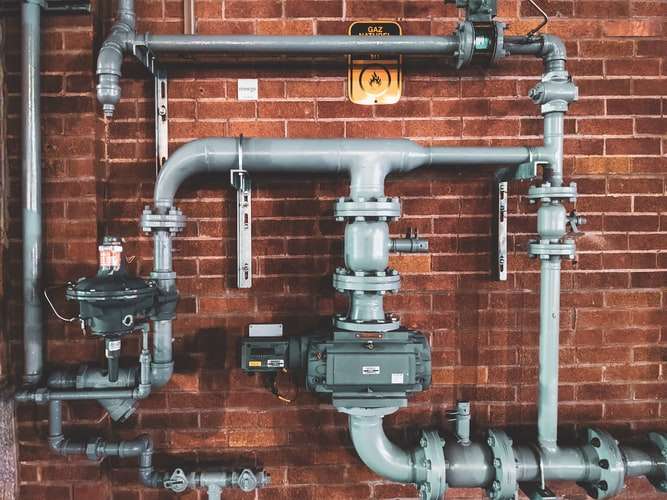Similar to carpenters, handymen,and general contractors, plumbers must have business insurance in place.It ensures their financial protection and a safety net if things go wrong.
Plumbers insurance grants the comprehensive protection plumbers need against lawsuits, accidents on the job, and other risks related to plumbing business operations. In addition you can use it if you want to start a plumbing company.
General Liability Insurance for Plumbing Businesses
Also called plumbing liability insurance, general liability insurance grants protection if a claim for bodily injury or property damage is filed because:
- A client or supplier slipped and fell while in your plumbing business’s office
- The client’s pipe exploded while you were cleaning it
Your plumbing company gets a minimum of $300,000-$2 million from general liability insurance.
|
CoverWallet |
NEXT (Best) |
Thimble |
Hiscox |
| Per occurrence limit |
$1,000,000 |
$1,000,000 |
$1,000,000/$2,000,000 |
$300,000/$2,000,000 |
| Aggregate limit |
$2,000,000 |
$1,000,000/$2,000,000 |
$1,000,000/$2,000,000 |
$300,000/$2,000,000 |
| Products and completed operations aggregate limit |
$2 ,000,000 |
$1,000,000 |
$1,000,000 |
$1,000,000 |
| Personal and advertising injury coverage aggregate limit |
$1,000,000 |
$1,000,000 |
$1,000,000 |
$1,000,000 |
| Tenant legal liability coverage aggregate limit |
$100,000 |
$1,000,000 |
$100,000 |
$100,000 |
| Non-owned/hired auto liability coverage limit |
Excluded |
Excluded |
Excluded |
Excluded |
| Equipment breakdown floater |
Excluded |
$2,500-$5,000 |
$2,500-$5,000 |
Excluded |
| Employment benefits liability floater |
Included |
Excluded |
Excluded |
Excluded |
| Name additional insureds? |
Yes |
Yes |
Yes |
Yes |
| Waiver of subrogation included? |
Yes |
No |
Yes |
Yes |
| Deductible |
$0 |
$0 |
$0 |
$500-$2,500 |
Plumbers Public Liability Insurance
Plumbers public liability insurance covers bodily injuries or property damage sustained by third parties because of your business. This doesn’t grant protection against other exposures. In the USA, public liability insurance is included in the language of general liability insurance.
Plumber Professional Liability Insurance
plumber professional liability grants protection if a client files a claim because your business or its employee caused issues while working.
You can use this insurance to cover settlements, defense costs, and court judgments if you’re held liable for:
- Negligence
- Misrepresentation
- Violation of good faith
- Violation of fair dealing
- Breach of contract
Most plumbing company insurance packages offer professional liability insurance with a $250,000-$2 million per occurrence limit.
This table compares the features and limits of the professional liability insurance of companies that underwrite small business insurance for plumbers.
|
CoverWallet (Best) |
NEXT |
Thimble |
Hiscox |
| Per occurrence limit |
$1,000,000 |
$10,000/25,000 |
$1,000,000/$2,000,000 |
$250,000 |
| Aggregate limit |
$2,000,000 |
$20,000/$50,000 |
$1,000,000/$2,000,000 |
$250,000 |
| Name additional insureds? |
Yes |
Yes |
Yes |
Yes |
| Waiver of subrogation included? |
Yes |
No |
No |
Yes |
| Deductible |
$0 |
$0 |
$500 |
$500 |
Commercial Property Insurance for Plumbers
Aside from lawsuits, the damage or destruction of your office, equipment, and other commercial property can result in significant drawbacks for your plumbing business.
Commercial plumbing insurance coverage protects your business’s tangible assets. This will reimburse your losses and helps you recover if these exposures happen:
- Fire
- Theft
- Vandalism
- Civil commotion
- Riot
- Volcanic action
- Lightning
- Impact
- Vehicle
- Aircraft
- Rain
- Winds
- Snow
- Hail
This table compares the limits and features of commercial property insurance from the recommended companies.
|
CoverWallet |
NEXT (Best) |
Thimble |
Hiscox |
| Building coverage limit (minimum) |
$50,000 |
$110,000 |
$100,000 |
$15,000 |
| Contents coverage limit (minimum) |
$50,000 |
$15,000 |
$100,000 |
$15,000 |
| Outdoor signs |
Excluded |
$2,500 |
Excluded |
Excluded |
| Accounts receivable |
Excluded |
Excluded |
$5,000/10,000 |
Included |
| Money and securities |
Excluded |
$2,500 |
$1,000 |
Included |
| Lock and keys |
Excluded |
$2,500 |
Excluded |
Excluded |
| Business interruption floater |
Excluded |
Included |
Included |
Included |
| Equipment breakdown floater |
Excluded |
Included |
Excluded |
Excluded |
| Inland marine insurance floater |
Excluded |
Excluded |
$10,000 |
Excluded |
| Employee dishonesty floater |
Excluded |
$5,000 |
$2,500 |
Included |
Workers Compensation Insurance for Plumbing Contractors
Workers’ compensation is a plumbing insurance coverage that provides a helping hand when an employee experiences a work-related injury or disease.
Workers’ compensation insurance provides the money your business can use to pay an employee’s:
- Medical treatment
- Hospitalization
- Medication
- Rehabilitation and retraining
- Lost wages
- Funeral expenses and allowance to dependents in case of death
Tools And Equipment Insurance for Plumbers
Tools and equipment insurance is offered as a stand-alone policy or as a floater to commercial property insurance or general liability insurance of plumbing company insurance programs.
Also called plumbers tools insurance, this protects the drills, wrenches, welding machines, and other implements for fixing or installing plumbing systems.
Tools and equipment insurance kicks in when plumbing equipment and tools you own get damaged or lost because of:
- Fire
- Theft
- Operator error
- Electrical breakdown
- Electrical shorts
- Mechanical breakdown
Plumbing Insurance Cost
General liability insurance for plumbing contractors costs $50.08 per month or $600.96 per year for a $1 million coverage. This plumbing liability insurance cost estimate assumes that you have 5 employees and make $500,000-$750,000 per year. Get cheap plumbers liability insurance quotes by:
- Having high deductibles
- Removing floaters if they’re useless
- Getting policy bundle discounts
To determine plumbing insurance cost, carriers use your location, business history, claims history, annual revenues, and number of employees.
|
Cost per Month |
Cost per Year |
| General liability insurance |
$50.08 |
$600.96 |
| Professional liability insurance |
$60 |
$720 |
| Commercial property insurance |
$53.08 |
$636.96 |
| Workers compensation insurance |
$80.25 |
$963 |
| Business owner’s policy |
$52 |
$624 |
Best Plumbing Insurance Companies
NEXT
NEXT offers streamlined online solutions in its plumber’s insurance, making it one of the best insurance for plumbers. Through its platform, the company allows customers to add or remove insurance policies, pay premiums, and get instant proof of insurance.
Rating:7/10
Pros
- Best overall
- Great customer service and reputation
- Issues an online proof of insurance instantly
- Outstanding value for money
- Bundle two or more insurance policies and get a 10% discount
Cons
CoverWallet
It’s an insurance broker selling plumbing insurance to its partners such as CNA and Progressive. Nonetheless, we included it in our list because it also offers tailored plumbing insurance by customizing the insurance products of partners.
Rating:10/10
Pros
- Has an online quotes generator that allow you to compare the offers of different insurance companies
- Get insured online
- Offers more than 17 types of business insurance products
Cons
- Not an insurance company. Therefore, the policies CoverWallet offers are underwritten by its partners
Tivly®
Tivly® grants coverage through its contractors insurance program. Policies you can get are general liability, workers compensation, commercial property, and other business insurance policies.
Rating:10/10
Pros
- Responsive customer service
- Call and compare quotes over the phone
- A partner of many reputable insurance companies
Cons
- You need to call to get a quote
Thimble
Thimble offers short-term general liability insurance for plumbing businesses and independent plumbers. Coverage can last for hours, days, weeks, or months. You can also get a long-term plumbing contractor insurance plan consisting of general liability, commercial property, and workers’ compensation insurance.
Rating:9/10
Pros
- Get covered online
- Insurance for plumbers by the hour, day, week, or month
Cons
- Some customers reported that Thimble took long to respond upon being asked about the status of claims
Hiscox
Hiscox offers general liability, business owner’s policy, and professional liability insurance for plumbing businesses. This company is great for customers who want to get $300,000-$2 million worth of coverage with waiver of subrogation included.
Rating:6/10
Pros
- Offers hefty limits on its liability insurance for plumbers
- Worldwide coverage
- 14-day money-back guarantee
Cons
- Complaints from customers are considerably high
State Farm
State Farm plumbing coverage includes property coverage, installation insurance, mobile equipment coverage, and general liability. Also, the company allows clients to fully customize their policies.
Rating:5/10
Pros
- Affordable general liability coverage
- Wide range of policies
- Customizable policies
Cons
- Pricey public liability policies
Geico
It was, founded in the 1930s, is known for their marketing campaign that features their signature Geico.
GEICO plumbing commercial insurance is available to customers in partnership with Hiscox. This policy will cover plumbers in case of property damage, physical injuries, and advertising injury.
Rating:7/10
Pros
- Cheap prices for commercial auto insurance
Cons
- Doesn’t have its own insurance for plumbers and offers policies from its partners








